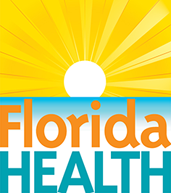 | |
 | |
| Department overview | |
|---|---|
| Preceding Department |
|
| Jurisdiction | Government of Florida |
| Headquarters | Tallahassee, Florida 30°23′N84°14′W / 30.39°N 84.23°W |
| Department executive | |
| Website | www |
The Florida Department of Health is responsible for protecting the public health and safety of the residents and visitors of the state of Florida. It is a cabinet-level agency of the state government, headed by a state surgeon general who reports to the governor. The department has its headquarters in Tallahassee. [1]